- Home
- Sonya Hartnett
What the Birds See Page 5
What the Birds See Read online
Page 5
Marta isn’t the girl Beattie raised. That girl had been named Maggie. Marta emerged when Maggie turned twenty, announced that Maggie wasn’t fitting, and rechristened herself with the new name. Marta gets terribly upset if Beattie forgets to whom it is she’s speaking. In fact, there’s a great deal about Maggie’s mother, her siblings, and her history that upsets Marta, and she’s been known to fiddle with the truth about each of these when in conversation with her glamorous friends – Marta has, on occasion, publicly denied she has any connection at all to this staid suburb and these unexceptional people. She has, just to be safe, thrown off most of those old companions who could catch her out in a lie. Now she’s saying, “I told you, Mum. Didn’t I tell you? I always said you’d regret it.”
Rory sits at one end of the table, an elbow creasing the damask and his chin in his palm. He is not a big eater and has left most of the roast. Brother and sister do not get along and never really have, and they are now in the midst of a time-honoured battle, a discussion which is served up at this table as frequently as gravy. It is a meaningless tussle, achieving nothing and going nowhere: Beattie brushes it like salt from her lap, forgetting as she hears. It is now Rory’s moment to enquire archly, “What was she supposed to do?”
Marta is always spoiling for a fight, even for one as senseless as this. She snarls, “Well, she certainly couldn’t ask you for help. A baby can’t care for a child.”
It’s another of those things Marta is loath to tell her smart friends, that her brother has evidently lost most of his mind. To her friends she describes Rory as eccentric; to his face she calls him a hypochondriac. Beattie won’t stand for that, and here moves in to deflect the conversation back to the topic. She is keeping one ear tuned for sounds of Adrian nosing round the door – she can hear the gabble of the television and hopes it is keeping him hypnotized with some inanity. “Keep your voices down,” she murmurs, reaching over the table to needlessly rearrange the serving bowls. “There’s bat ears in the house.”
Marta trembles, draws a persecuted breath. “I know you think I should take him,” she says, “but think about it reasonably, Mum. He wouldn’t fit into my life. And I refuse – I absolutely refuse – to be the dumping ground for other people’s mistakes. Why should I be?”
“Yeah, why should you be?” Rory stares blackly down the table. “Why should you do anything for anyone?”
“Until you can make yourself useful, Rory, stay out of this!”
“Shh, now…”
“He’s no trouble to keep, you know. He’s docile. It’d be like having a Pekinese. You could fit one of those into your life, couldn’t you?”
“At least I have a life!”
“Ignore him, Marta—”
“He’s deliberately antagonizing me, Mum!”
Beattie ruefully shakes her head. She knows that her daughter leads a ritzy existence, that she has countless friends clamouring for her attention, that she’s forever being invited to some exhibition or premiere. She has a job in advertising which involves long lunches, harmless flirting, and a sound knowledge of wines. It is a life like a maelstrom of all things material, modish, faddish, covetable, a life in which there’s clearly no place for a sombre nine-year-old boy – yet Beattie feels equally that there’s no such place in her own. She has no youth left to give the young. Her husband had taken years to die, his cancer ponderous as a mule though leaving devastation in its wake; in the final year it had moved more swiftly, and also more gruesomely. In the drawn-out years of his dying, some of Beattie too had died: the husband’s disease had chewed a dark path into the heart of the wife. Lester had become less a man than a burden to her; her fondest memories became infected, and love deteriorated into impatience and pity. With his death she believed herself freed – then Adrian had arrived, needy as a chick, remaining to hang like shackles from her arms.
The three of them contemplate their pale, smeared plates. In the background the television burbles away reliably. “If his own mother wasn’t so hopeless,” remarks Marta, pointlessly.
“And his father,” adds Beattie. “Don’t forget that fool.”
“Both of them. So selfish.”
“It’s in the blood,” says Rory.
Marta jabs like an adder. “Talking about yourself again?”
Beattie leaves them to it while she gathers up the plates. She deludes herself that they’re fond of each other, brother and sister, though they’ve fought like curs since childhood. Only poor Sookie, the eldest, ever seemed glad for the comfort of siblings. Sookie always said that Maggie – Marta – could never forgive Rory for being born, for thieving the post of youngest and forcing her to become troubled middle child; the irony is that it’s Sookie who is alone now, Sookie unforgiven and unseen. Piling the dirty plates on the sink, Beattie feels a surge of grief for them, her three marred children, beyond her reach and adult now, sunk so sightlessly into themselves that not one of them is capable of caring for any other thing.
Adrian stands at the lounge-room window. His fingers feel their way down the sleek body of the cherub, slowly and blindly as snails. A conscientious boy, he usually does his homework as soon as he gets in from school; this afternoon he is too restless, and his satchel lies discarded on his bedroom floor. He stares between the venetian slats, watching the wind toss the trees; distantly he detects Aunt Marta’s perfume, an abrasive odour loitering in the dining room from her visit the night before. But he gives little thought to the scent, or to what he sees: his concentration is all in his fingertips, in the cold solace of the bronze cherub, in its compact, bloodless permanence.
Adrian is a child for whom life easily falls apart. The smallest difficulties and upsets can effortlessly shatter him. Standing at the window, he is engulfed by worries that surge in sickening waves; his grey eyes have gone shiningly damp, as though the fears are leaking out. He is only nine years old, and already the world is overwhelming; he wonders how he will survive when he’s grown, when his anxieties have had years to flourish and multiply.
Today, at school, Horsegirl has Gone Too Far. For the past week she has cultivated a hatred of the substitute teacher, and today she had let it loose. Prickles run down Adrian’s spine just to think about it.
All week Horsegirl has been less horse than some other, more capricious animal. She has sat at her corner desk and grizzled and gnashed and groaned. She has hissed, open-mouthed, tongue arching behind her teeth. She’s thrashed her head, torn her hair, writhed her arms and legs. She has occasionally howled and gargled; one alarming afternoon she took to screeching like a cockatoo. The wild creatures inside her have fought one another in their determination to have their say. The substitute teacher has been the unnerved object of their derision. From the corner, every day, Horsegirl’s feral grunts and yowls have greeted everything the teacher said and did. Today, this afternoon, it had become more than anyone could bear.
Horsegirl had been jibbering like an ape. She had been joggling around in her chair. As the teacher talked of triangles, Horsegirl joggled, jibbered and smacked her head in a hideous running commentary. Outside, the sky was colourless; rain was hammering down. The teacher’s voice was high and strained. The children had long since stopped learning, they’d long since ceased to smirk behind their hands. Now they sat in rigid silence, swamped by Horsegirl and the rain and the tense, harrowed voice struggling across the room. Into the pits of their stomachs had seeped a pool of dismay. All of them sensed that nothing good would come of this.
None of them, however, guessed what was going to happen next.
The teacher snapped – like a rubber band, painfully. She stormed the length of the classroom, knocking pencils and books from the desks she swept past. She reached Horsegirl’s table with her cheeks burning red. “Shut up!” she shouted. “Be quiet!”
Horsegirl, unflinching, sneered at her, spit blurting out her lips. Her hands fluttered above her head like broken, starving doves. She rolled her eyes, made choking sounds. The teacher thumped the desk.
“Stop it!” she bawled. “Shut your mouth!”
Horsegirl’s eyes stopped rolling with a jolt; her head lurched forward on her spindly neck and she yelled, a warped echo, “Shut your own mouth!”
The teacher’s angry hand closed over Horsegirl’s bridle, which lay draped along the edge of the desk. The child squealed in protest, lunging for the precious leather. For a moment the bridle was pulled tight between them, buckles spinning in the air. Then Horsegirl screamed, and the teacher let go. “All right,” the woman started, “sit down—”
But Horsegirl stayed screaming: her arm lashed, bullwhipping the long reins through the air. They slapped across the teacher’s face, flipping up a hank of her hair. The sound of it was clean and spry: the little girl sitting behind Adrian gulped, horrified. The rain came down suddenly cyclonic, as if wanting this scene washed away.
The teacher put a palm to her cheek, rocking in her sensible shoes. She stumbled backwards until she bumped a chair. Then she pivoted, bent double, and ran from the room. The children that she passed on the way would testify to her face being striped crimson, and to tears pouring from her eyes.
Horsegirl sat down to arrange her tack.
The other children sagged stupefied in their chairs. They gazed dazedly around themselves, rabbit-eyed. The absence of a teacher usually encouraged, from certain quarters, an uprising of chatter and mischief, but today even the naughtiest children had made no sound. All of them felt the ghastly wrongness of what had happened, that this was a thing beyond crime, beyond cardinal sin, to make a teacher cry. They understood they had witnessed something a child should never be allowed to see. Each of them felt they’d contributed in some way to this awfulness and that they would, in consequence, be resoundingly punished – each of them except Horsegirl, that is, who might have been oblivious but for the tight smile on her lips.
The little girl behind Adrian stood, and every pupil watched her wander the length of the room to where a waterless aquarium sat on a shelf. Inside the aquarium were silkworms, which the class was trying unsuccessfully to breed. The girl leaned her head against the glass, and two tears meandered down the pane. Adrian looked at Clinton, who sat alert as a hare. He would take this event home to his mother and return to school tomorrow with her opinion converted to gospel. Until that time, he would have nothing definite to say.
The classroom door had opened, and the principal came into the room. The children stood, as they’d been trained. “Sit down,” she said gently, and they did. It was a relief to straighten their knees, to see a responsible face. She enquired of a reliable girl as to where the class was in its maths book. “Finish the page,” she told them. “I’ll be back to see your work.” Then she had left them alone again, and the feeling of discomfort had returned. Only Horsegirl was calm and murmuring quietly, less carnivore than peaceable omnivore now. But Adrian had not doubted that she knew what she’d done, that some gleeful nook of her mind was obsessively rewinding and replaying the delirious scene.
The wind changed direction and threw hailstones at the windows. The weeping girl left the silkworms and stumbled back to her chair. The children flipped through their maths books until they found the page. Finally, whispers had begun to rise. Paul, the clever boy, called out the first three answers, and everyone wrote them down.
Minutes later the substitute teacher returned. With her came the principal. The pupils stood, laying their pencils on the page. The teacher walked straight to the blackboard. The children she passed searched for red streaks. The principal went to Horsegirl’s desk. Horsegirl was not standing, and only unwillingly put her pencil down. The principal talked softly into her ear – Adrian heard her say Horsegirl’s name. The child nodded, and pushed out her chair. The entire class watched as she followed the principal from the room, slouching on her large feet, over-tall and ungainly, her dress ill-fitting, her face made for someone older. She had not forgotten to take the bridle with her, and carried it tenderly, as though it were a kitten.
In the lounge room, Adrian’s fingers are skirting the bowl. He feels the raised frieze of what are supposed to be flowers but have always looked, to him, like squashed flies. He stares through the rain-stained window, past the bare-boned liquidambar and over the black span of road. It stopped raining an hour ago, but everything drips.
He had watched Horsegirl go, her head held high on a fearsome pride. He’d thought about the madness in her, a lunacy everyone knew was there, never guessing its frenzied depths. Horsegirl seemed to swim in her craziness; worse, she seemed to enjoy it. She was lawless and dangerous, frightening, repellent. No one could like her, no one wanted to talk to her or have anything to do with her, she was everything that was untouchable.
His fingers stagger around the frieze. He grazes his knuckles down the swollen flank of the bowl. Standing at his desk watching Horsegirl stalk away, his hands had craved the reassurance of the bowl, as though all hecticness could be stilled by its antique caress. His heart had pattered fast until the moment he’d pushed his palm to its gold-green side. Adrian does not know why, but every time Horsegirl’s madness flares, he fears for the soundness of his own mind. He worries that what lives so violently within her is also living in him. He fears that Horsegirl is contagious, to nobody but him. He remembers his father once saying that Sookie, Adrian’s mother, was mad; for good measure he’d added that Beattie, Rory and Marta were mad too. He’d warned his son that, sharing as he did this unhinged blood, Adrian might well be crazy also. Adrian had known his father wasn’t serious, that he was upset and being cruel, but nonetheless it bothers him, recalling those words. It’s consolation to remember that Horsegirl is St Jonah’s child but that he, Adrian, is not: the difference is vast, vast enough to ensure they can never be the same.
Not long after she’d left the room, Horsegirl had returned. The children were astonished – not one of them had expected to ever see her again. But there she was, bringing her bridle and her mothy, wet-wool smell. She sat down and doodled the afternoon away, and the teacher didn’t tell her to sit up, didn’t ask her any questions or take any notice of her – though everyone in the classroom knew that she was there.
Adrian sighs. He lets his hand drop from the bowl and when he chews his thumbnail, his fingers smell bitterly of bronze. Today is Friday, and he is glad the weekend has arrived. Yesterday he’d presented the spoke decoration to Clinton, happy in anticipation of his friend’s gratitude. Clinton, however, had glanced at the trinket and given it back to him. “I don’t collect them any more,” he’d said – not unkindly, but the embarrassment made Adrian queasy. Paul, the smart boy, was standing nearby, and asked to see the toy: when Adrian handed it over, Paul sent the disc flying like a miniature frisbee. Adrian’s nausea had stayed with him and he’d wished his grandmother would let him miss a day of school. If he had been allowed to stay home today, he would not have had to see Horsegirl whip the substitute teacher.
But now it is the weekend, and he’s free.
Into the bare garden of the house across the road steps Nicole, trailed by her brother and sister. Adrian straightens, interested, pressing a venetian slat out of view. He lingers by the window long enough to ensure they’re not about to go off in the car, then rushes for the front door. He runs down the grassy slope of front lawn, the fallen leaves of the ambar skittering in his wake. The chill of early evening scratches like cat claws; dirty water splashes his sneakers and the hems of his jeans. He’s desperate to be with someone who played no part in the humiliation and bewilderments of yesterday and today.
Nicole and the children watch him run, craning their heads like birds. Mr Jeremio built the fence low, with bricks the colour of sour milk; along the top of them stretches an elaborate band of rusty-blue wrought iron which the builder has not bothered to paint. The four children grip the metal swirls, peering through the gaps at each other. Adrian’s hair is in his eyes, the chilled air smarts his lungs. “Hello,” he breathes, joyfully.
“What’s your hurry?” snaps Nicole
, but he can tell she is pleased. He hops up and down with cold and cheer, the winter at his chest like a cat, his fingers feeling frozen to the iron. He looks at the younger girl, who might be six, and at the boy, who is baby enough to drool. He resists an urge to reach between the metal twistings and pat the child’s head. Excitement makes him babble – in one quick gulp he asks, “Where have you been? What have you been doing? Have you just been going to school?”
“Well, we—”
“Don’t tell him, Joely!” Nicole clips her sister’s shoulder, and casts Adrian a lofty scowl. “Why are you always asking questions? How come you’re always why this and why that?”
He shakes his head, bounces toes against the fence. “I don’t know.” And he really doesn’t know, nor does he care what they say, so long as they continue to stand amiably at the fence with him and he can feel welcome. “What’s your brother’s name?”
“Giles,” says Nicole, and the child looks enquiringly up at her. A skin of dribble has glazed his chin. Both Joely and Giles have hair like black lamb’s fleece, and their sister’s shaggy sheep face. “He’s only two years and six months,” Nicole informs her neighbour, “so don’t talk to him.”
Adrian wiggles a hand through the serpentine iron, holding it out for Giles to sniff. The boy’s cheeks are dewy, and purpled with cold. “He’s got a wet nappy,” Joely warns.
Adrian hugs his hands to himself at this alarming news. “Maybe you should tell your mum?”
“No, she isn’t—”
“I can fix it!” yips Nicole. “I’m not a baby, I can look after him. You might be a baby, but I’m not.”
“I know you’re not,” Adrian hastens, in retreat. “I didn’t mean—”

 Butterfly
Butterfly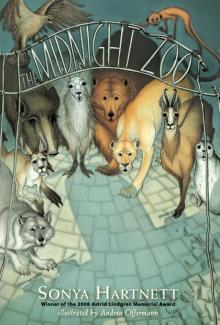 The Midnight Zoo
The Midnight Zoo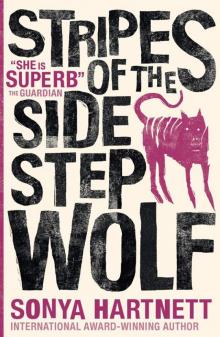 Stripes of the Sidestep Wolf
Stripes of the Sidestep Wolf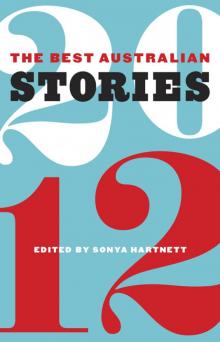 The Best Australian Stories 2012
The Best Australian Stories 2012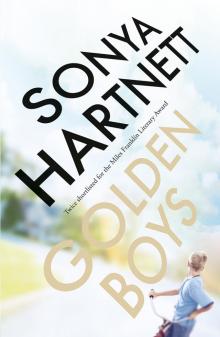 Golden Boys
Golden Boys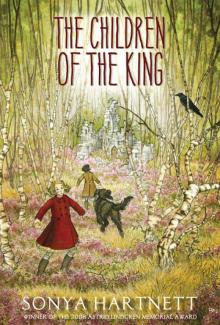 The Children of the King
The Children of the King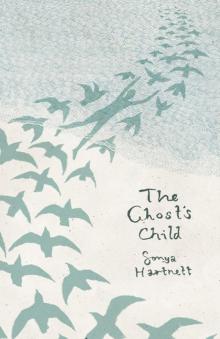 The Ghost's Child
The Ghost's Child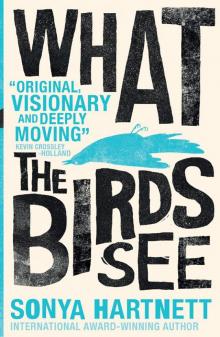 What the Birds See
What the Birds See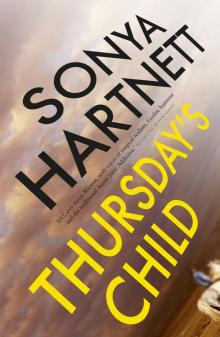 Thursday's Child
Thursday's Child